🤓 The 2026 Local Search Ranking Factors are here!! Check out the report!
🤓 The 2026 Local Search Ranking Factors are here!! Check out the report!



We’re definitely off to the races in local search happenings at the start of the new year! Hard to keep up? Don’t worry. I’ve got you covered and you can read through this round-up to be sure you know of any recent developments that could be impacting your local business or your digital marketing agency’s clients. Ready, set, go!
The quarter started off well with Ben Fisher sharing this Google communication that they had finally stopped suspending businesses who had been attacked by spammers moving their map pins. I personally first began seeing reports about outrageous Map pin shenanigans nearly a year ago and remember this example from Joy Hawkins in which the pins of multiple businesses had been moved to a single location:
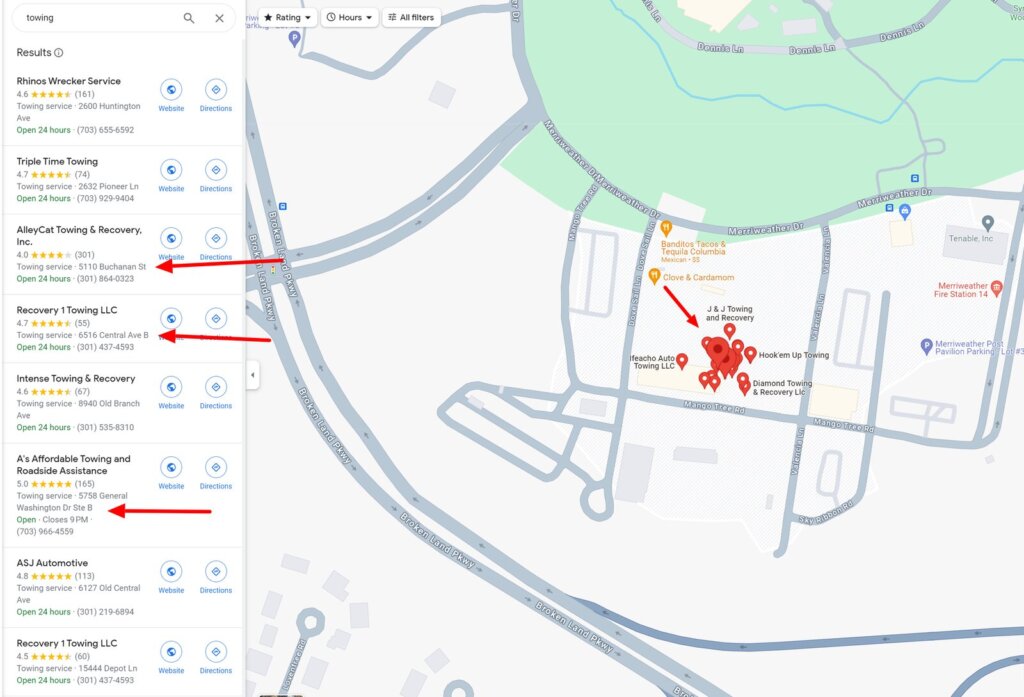
I would not want Google’s job of trying to keep up with the ever-evolving antics of spammers.
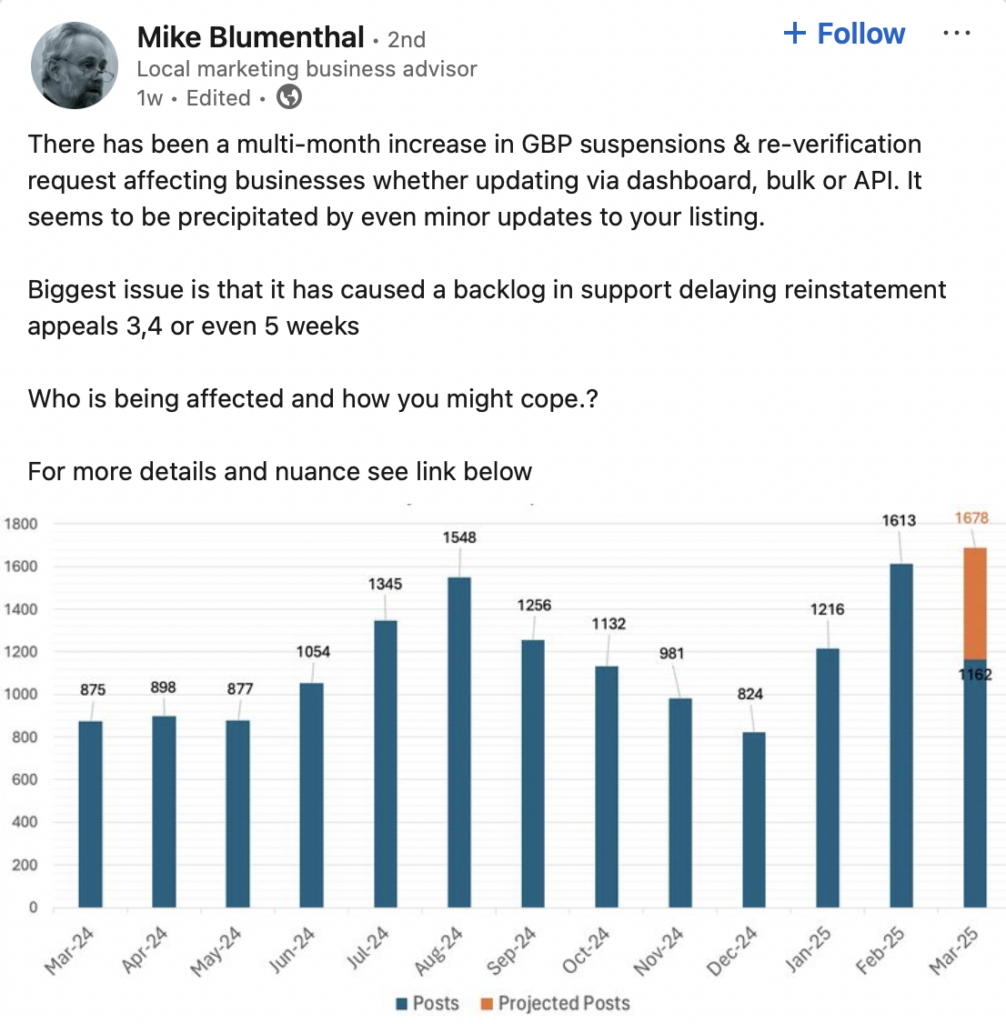
Mike Blumenthal has charted a significant increase of GBP suspensions and re-verification requests in Q1, and the bad news here is that support is backed up at Google and your reinstatement may not receive a response for as much as 5 weeks. Mike’s more detailed account at Near Media captures the frustration I’m hearing from multiple Google Business Profile Help Community Product Experts that the company has yet to provide any explanation of the delay or time frame for more efficient support. I can only advise patience, and empathize with how frustrating it is when an unearned suspension is impacting your real-world business, and you’ll have to wait weeks for resolution.
Claudia Tomina has a great LinkedIn post in which she’s urging Google to become more flexible in their verification requirements.
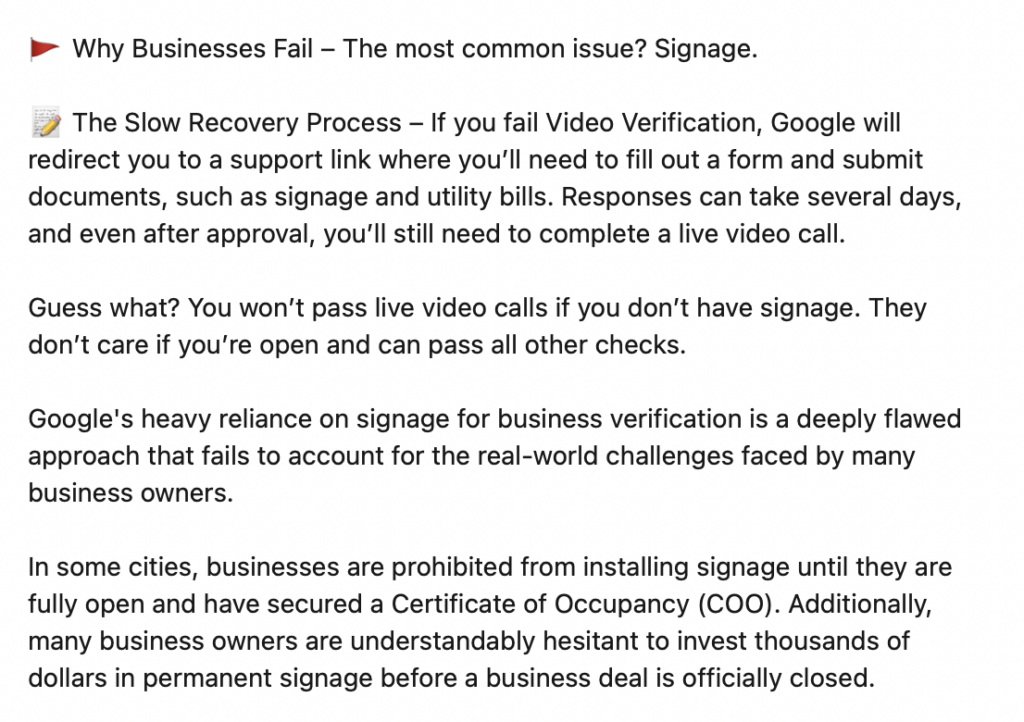
I highly recommend reading Claudia’s whole post so that your business or clients can be better prepared to pass video verification. Too often, we see cases in which Google’s policies simply don’t meet real-world realities, and I second Claudia’s plea for improvements in GBP verification flow.
One bit of good news was noticed by Darren Shaw, courtesy of Henry Heredia:
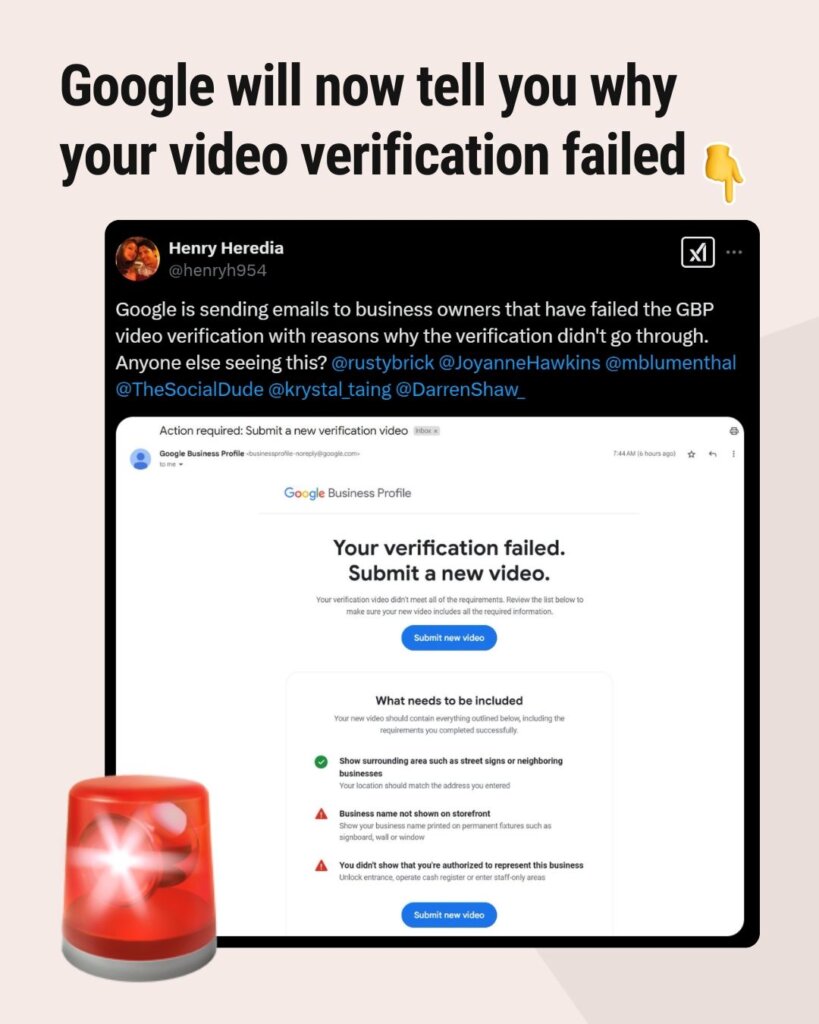
In the past, business owners had little or no idea why their video verification had failed. Now, Google will let you know what you need to include in order to pass verification.
Also from Claudia Tomina, this quarter, Google has rolled out the ability for restaurants to upload additional PDFs to their menus without overwriting their existing menus. This is good news for hospitality businesses that have multiple menus (e.g. a catering menu, plus a libations menu, plus a lunch menu).
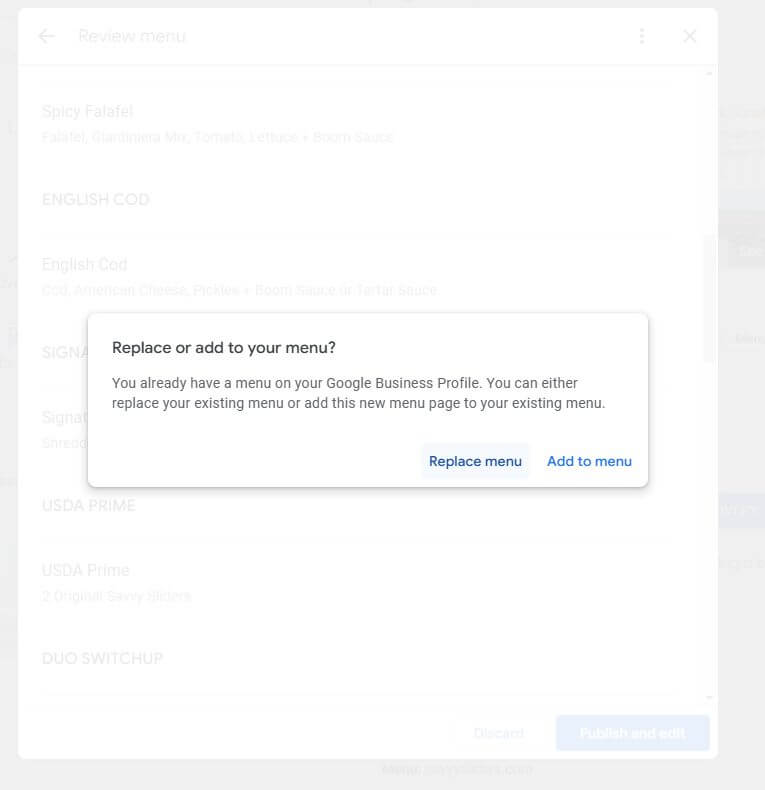
Additionally, as reported in full by Barry Schwartz, Google has made some nifty changes to menu management, including the ability to do drag-and-drop reordering, engage in batch price editing, and move items between sections. Read Barry’s piece to see all the screenshots of these improvements.
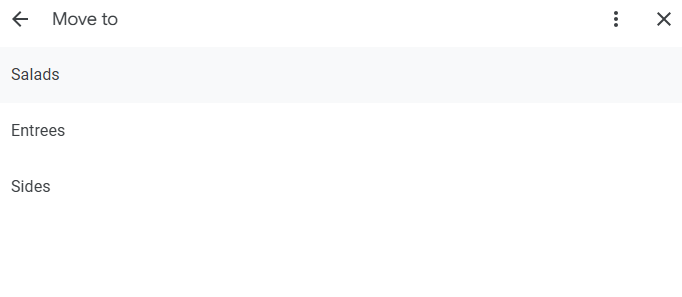
Claudia Tomina is on an absolute roll this quarter, turning up new features, like this one for managing special hours if you’ve got fewer than 100 GBPs:
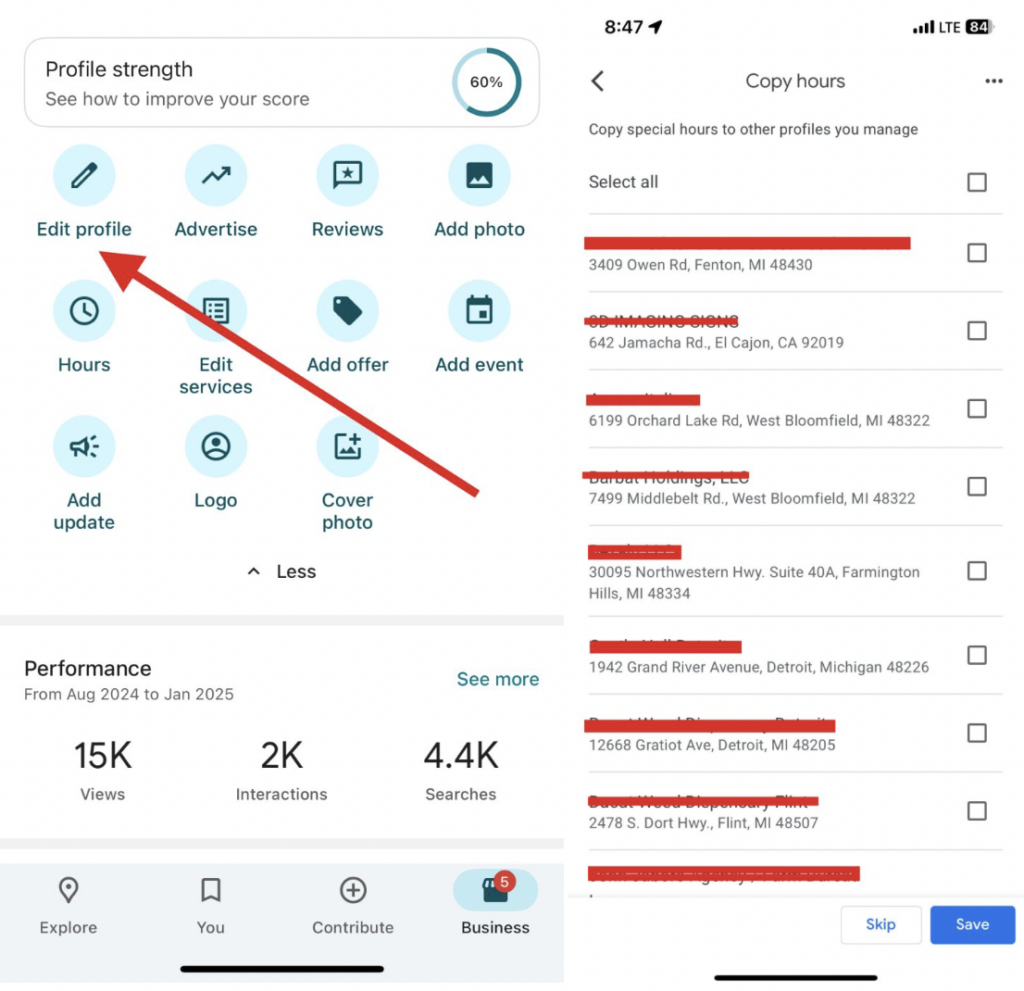
As Claudia explains:
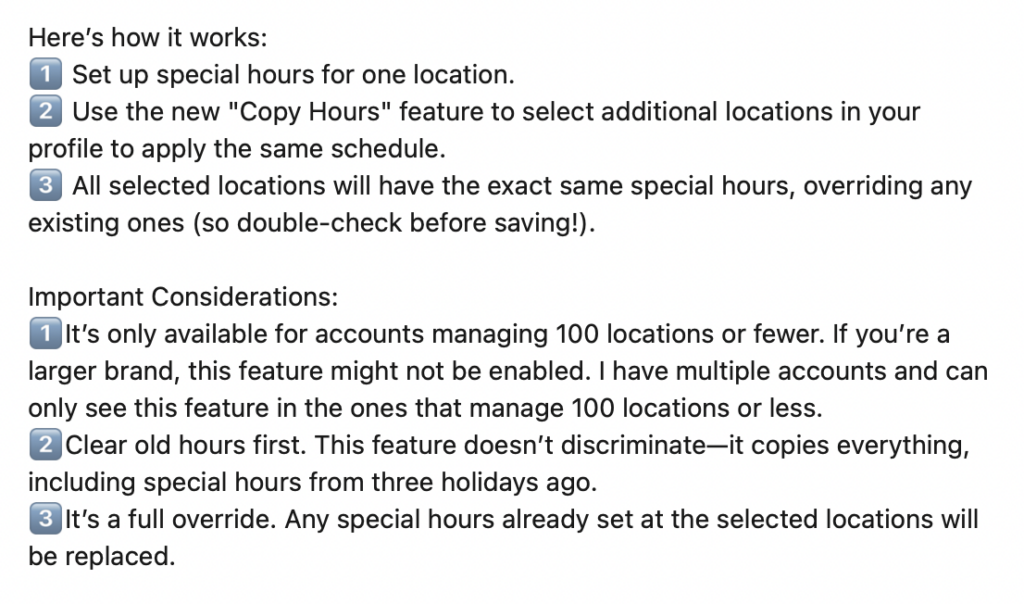
This could be a real time-saver for multi-location businesses!
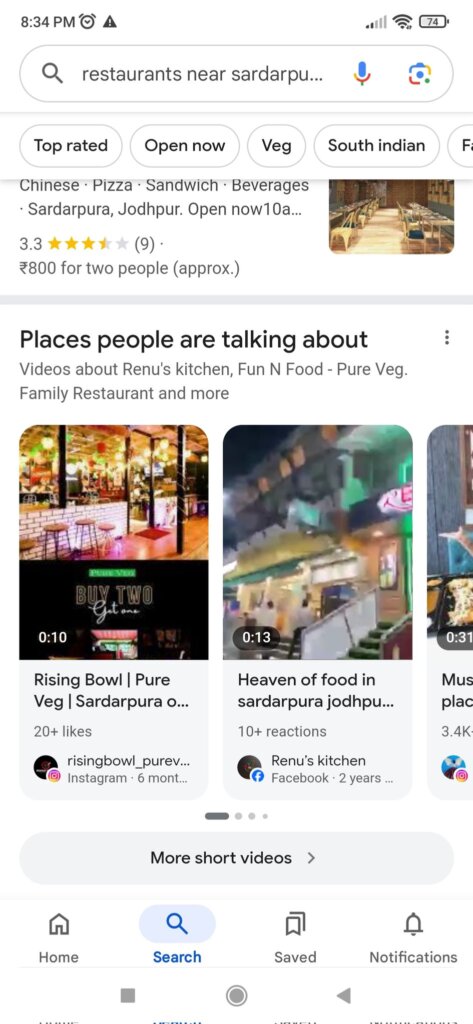
Khushal Bherwani captured the above test of a carousel pulling social posts from platforms like Instagram and Facebook discussing the virtues of various restaurants. This feature emphasizes the need to be running the kind of business that the public is excited enough about to share on their social profiles. The local-social connection gets stronger every year.
As our own Darren Shaw reports, you can now use a new AI-based feature in your Google Business Profiles to remove backgrounds from your product images and choose a preferred background setting. Darren mentions that he sees this as good news for anyone who has been worrying that the Products section of GBPs might be sunsetted in favor of Merchant Center. Here’s this new feature in action:
Vinay Toshniwal posted this tantalizing screenshot of a clinic being given the option to set both store opening hours and online operating hours on their GBP:
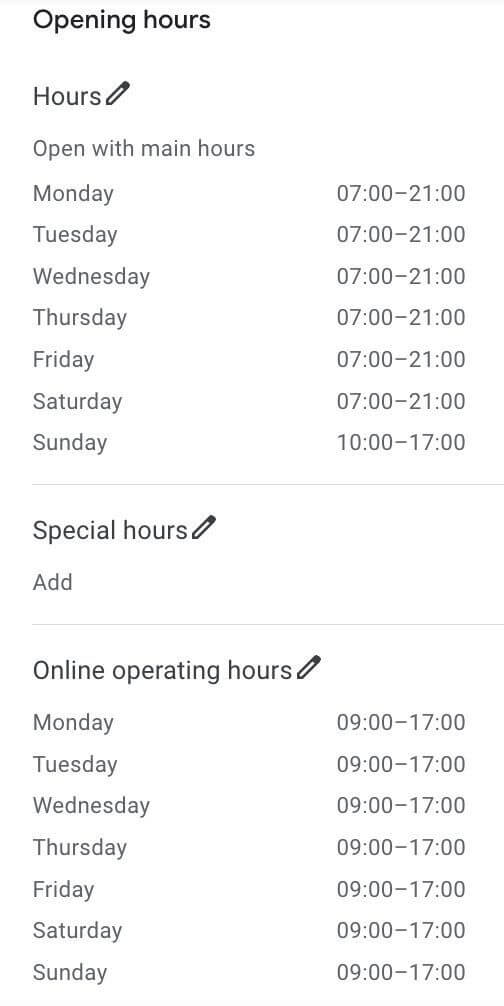
I’ve been unable to replicate this feature, and do not know how widely it has been rolled out, but it would be a terrific improvement. Many different businesses have different sets of hours for the different services they provide, such as a medical center having walk-in hours and after-hours online support. Let’s hope this feature is soon available everywhere.
Henry Heredia was the first I saw reporting on the arrival of WhatsAPP as a GBP chat methodology:
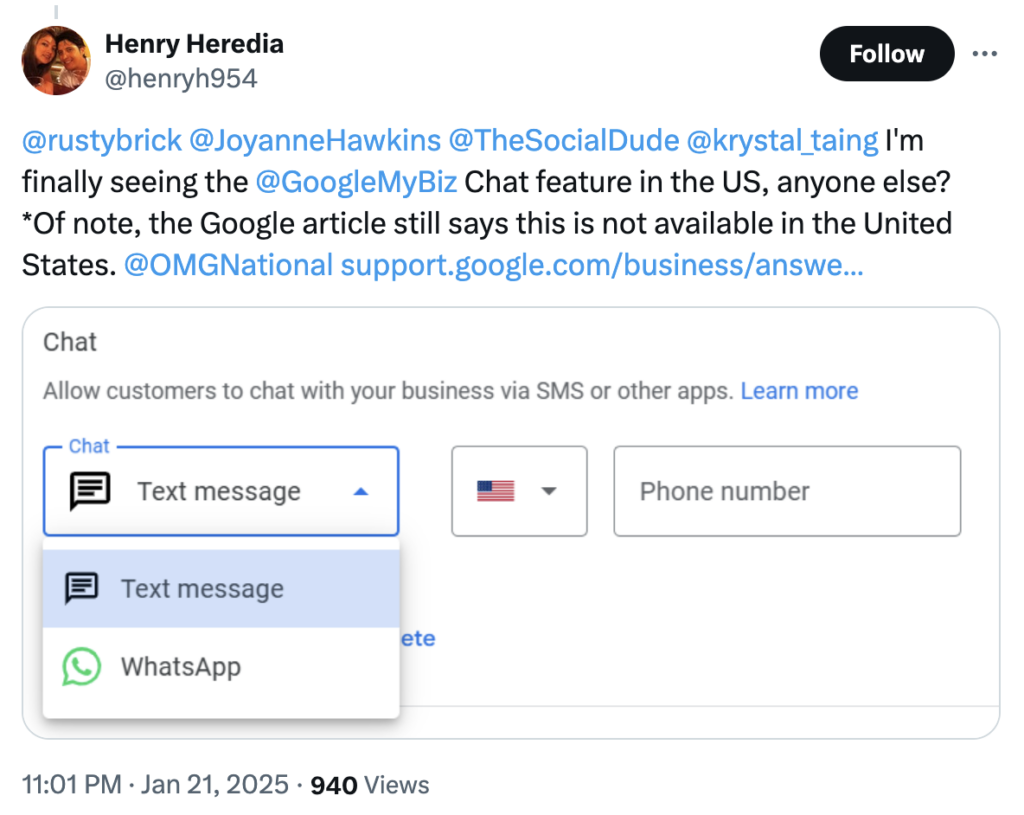
If you’re based in North America and aren’t very familiar with WhatsAPP, you’re not alone. It’s a private messaging system that’s huge on the other side of the pond, and which I’m most familiar with from listening to an inordinate amount of Irish radio. Barry Schwartz has a good write-up for further details. I’m curious to hear more about whether companies in the US, Canada, or Mexico are finding this feature useful for talking with customers on this side of the Atlantic.
Darren Shaw spotted an eye-catching upgrade on the history 360 View display of local business interiors. It shows up as the first image on a business’ profile, providing a walkthrough of the space:
This feature appears to be tied to an announcement Google made back in 2022 in which they stated,
“…thanks to advances in computer vision and AI that allow us to fuse together billions of Street View and aerial images to create a rich, digital model of the world — we’re introducing a whole new way to explore with Maps. With our new immersive view, you’ll be able to experience what a neighborhood, landmark, restaurant or popular venue is like — and even feel like you’re right there before you ever set foot inside.“
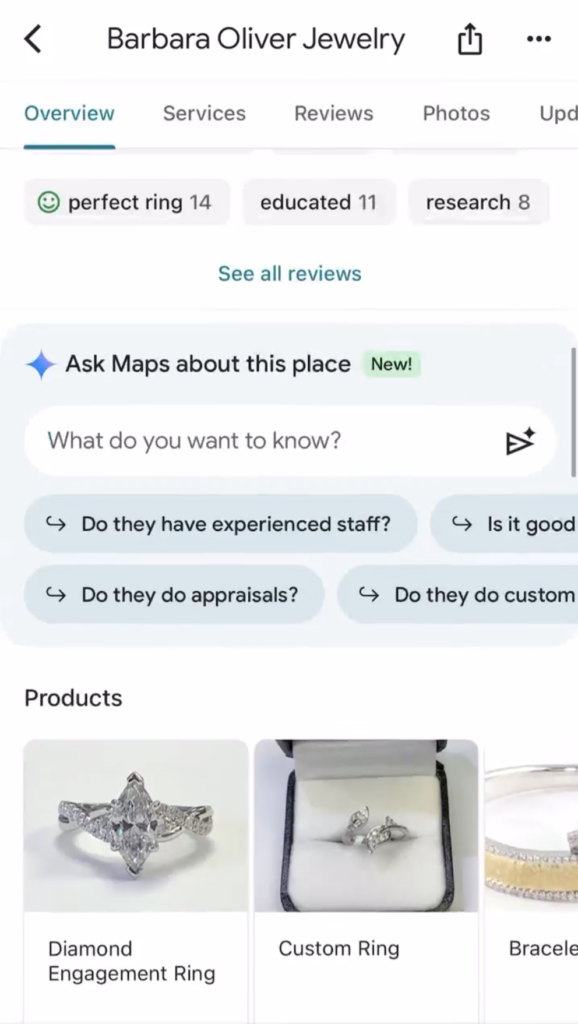
I first saw this test of a major development captured by Mike Blumenthal in this LinkedIn video demoing the presence of a Gemini-powered question-and-answer feature on one of his client’s listings. Mike’s partner, Greg Sterling, then went on to write a fuller explanation of the new interactive listing element at NearMedia, in which he stated,
“It uses Gemini to summarize information about the business drawn from its GBP, reviews, the website and third-party sources, apparently in that order. Mike discovered this at the end of last month. It’s effectively a much better version of Google Q&A. This mirrors the function of Amazon’s shopping assistant Rufus, with which you can ask questions about the product and reviews content. While “Ask Maps” hasn’t shown up for me I’ve used Rufus extensively on Amazon and it’s quite helpful.“
Like Greg, I’ve yet to see this test on any of the profiles I’ve looked at, but there’s been some chatter about whether Ask Maps could replace Google Business Profile Q&A, and as we’ll see in the next section of today’s round-up, Google appears to be ramping up questions it’s asking some reviewers, quite possibly to feed Gemini.
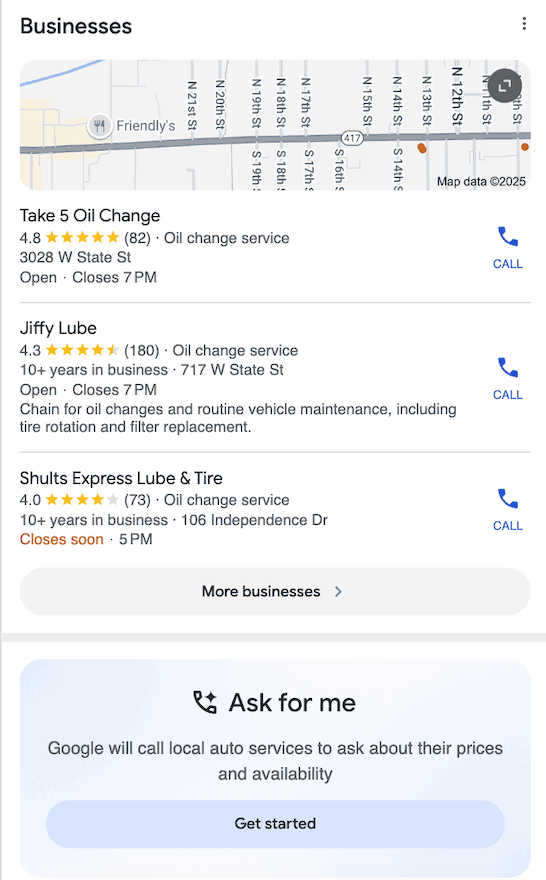
Not to be confused with Ask Maps, the Ask for me feature is one Mike Blumenthal has been testing out in Google Search Lab, and you can read his complete write-up here. Mike used this assistant technology to try to book an oil change and the product called businesses and returned him information about his nearby options over the course of about 17 minutes. He calls the test “quick, easy and impressive technology, but it is not at all clear that it is good for small businesses.”
Why would this not be great for SMBs? The first thing I thought of when I saw Mike’s test of this new experiment was the 2018 Duplex demo at Google I/O that caused a lot of buzz surrounding the use of an AI-driven voice assistant phoning restaurants and booking appointments with them. Stories began emerging of diners arriving at eateries that had no record of their reservations, but one of things that felt “off” to me about Duplex was Google’s forcing restaurateurs to opt-out of something they’d never signed up for. That bull-in-a-china-shop path Google has too often taken through the fragile economics of real-world local businesses has always bothered me.
But Mike sagely points out other reasons why the Ask for me feature might not serve the best interests of small business owners, including:
This is definitely an experiment to keep your eye on for future developments.
In early February, complaints of review loss began sprouting up like mushrooms after a rain all over social platforms and forums. People were reporting losing 30-50 reviews from their GBPs, and Barry Schwartz has a good piece tracking the storm as it passed through our local business community. Google acknowledged the issue on February 10th, after which some accounts began seeing some of their reviews return. Did you get all or some of yours back? I hope so!
The ever-gracious Claire Carlile kindly lent me this screenshot of the mysterious occurrence of GBP-based review ratings, counts, and stars appearing on random businesses in Google’s organic SERPs:

I have also seen instances in which only the stars were featured, with no review count included, and discussion is ongoing in the local SEO community about whether this is a genuine test, or just a bug. Look your business up to see if you are getting star treatment, but if you are, don’t count too heavily on it sticking around. Google has a long history of treating SERPs to stars and then taking them away.
It’s spring, and our own Darren Shaw is in love…with this new review/photo carousel layout in G Maps:
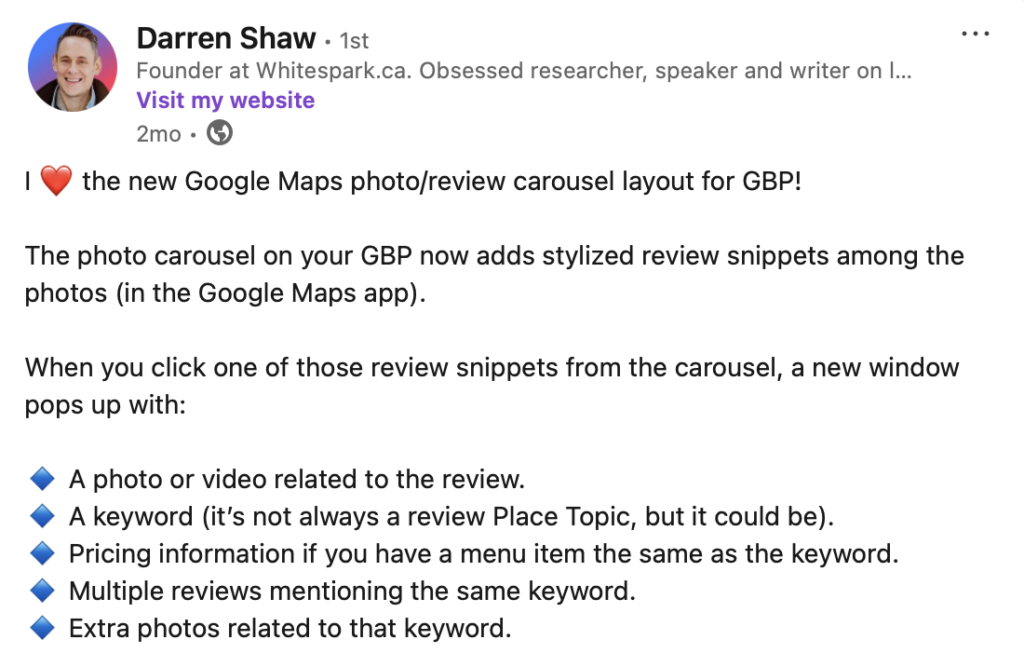
Watch the video in this post to see it action:
Darren has some great tips for optimizing for this cool feature, including:
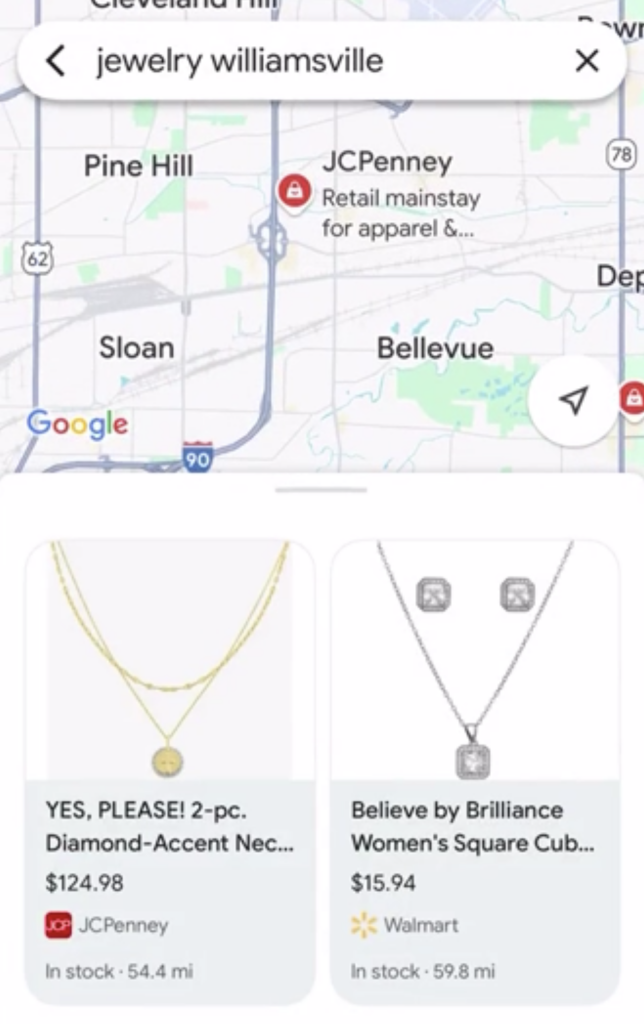
Mike Blumenthal was kind enough to walk me through how this new feature works. Here are the steps he provided:
“Do a product type query in GMaps: “Engagement rings Williamsville”. In addition to listings, Google is now showing a Merchant Center carousel feed of products that match the query and are near the query centroid. You can view these on a map by clicking the link below.”
You’ll see a display like this:
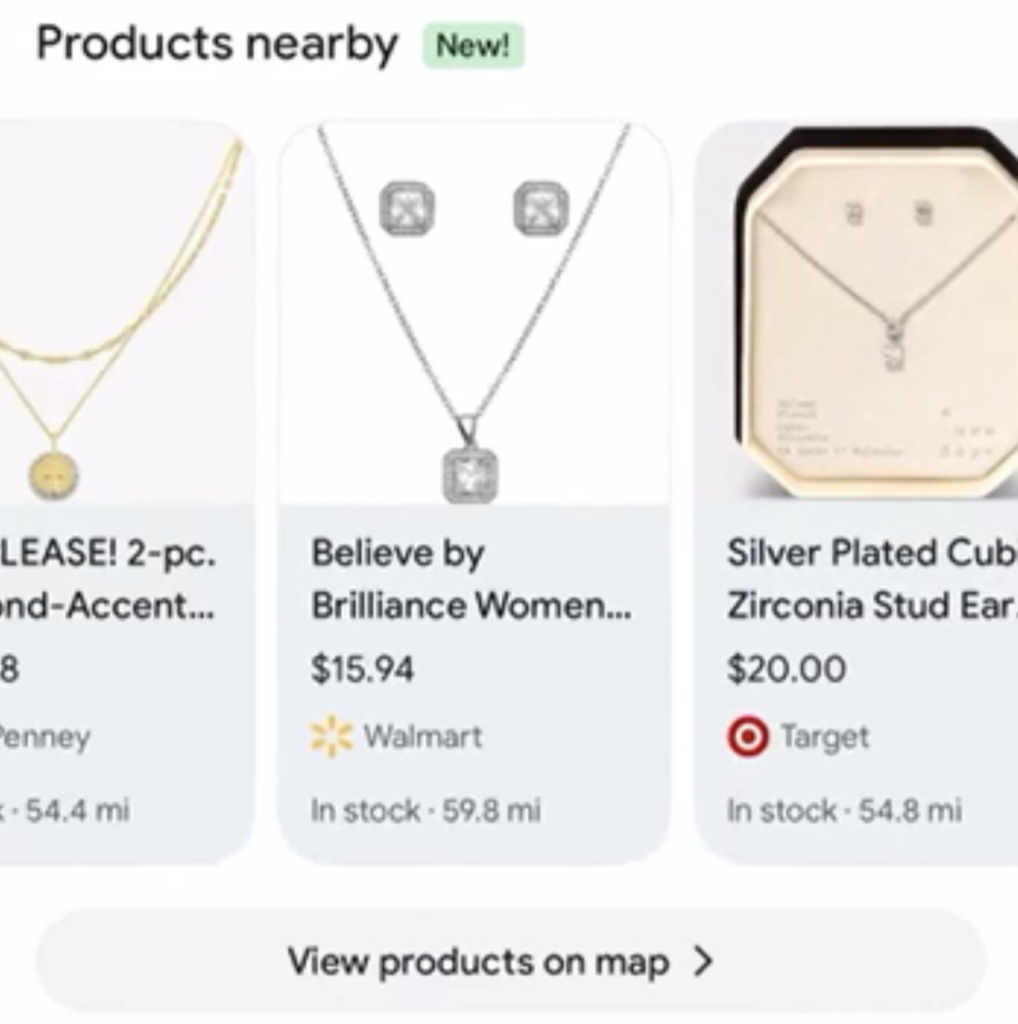
Always be on the lookout for that green “New” button in Maps-based results. This particular feature emphasizes the need to be photographing all your products and adding them to Google’s Merchant Center. The productization of Google local continues apace!
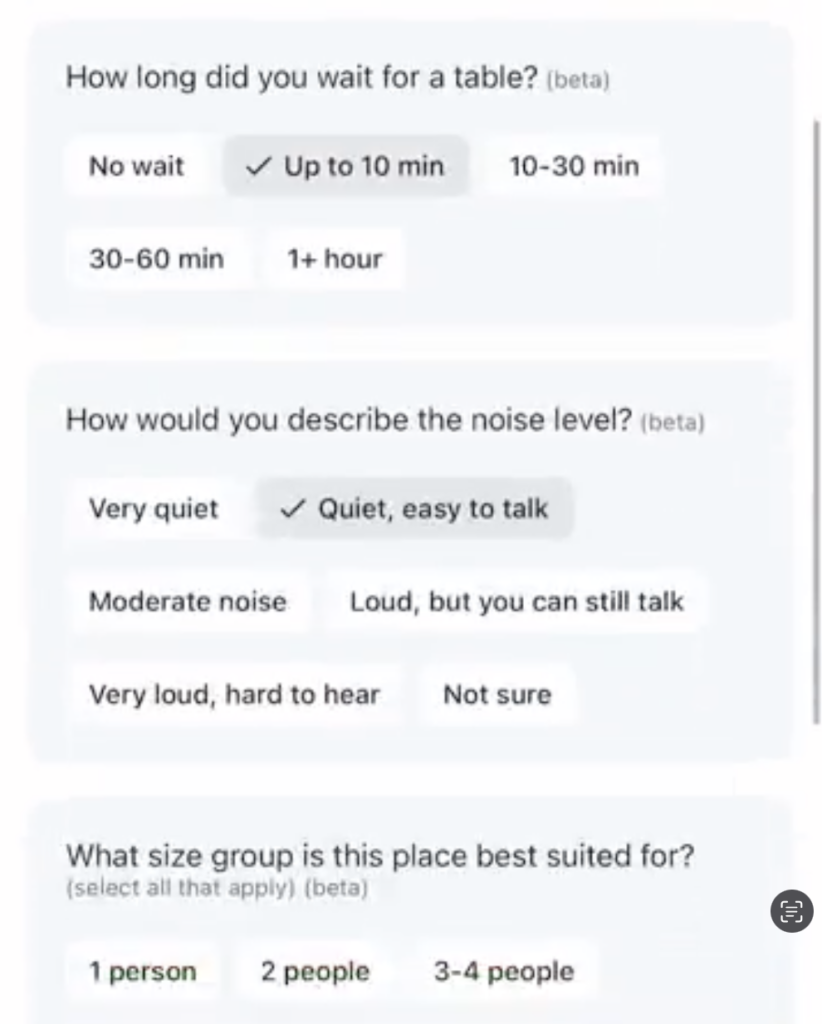
Claudia Tomina spotted an expanded set of questions Google is asking reviewers to answer when evaluating restaurants. This full data set now includes:
Claudia speculates that this expanded set of questions could be used to feed the Gemini-based Ask Maps feature mentioned above. Keep those reviews coming in!

I believe I’ve saved the most interesting news of the quarter for last. The above screenshot is courtesy of Joy Hawkins’ Linkedin tutorial on helping a client recover from what she has termed “the Diversity Update”. In February, the team at Sterling Sky revealed that they had been tracking a significant Google local algorithm change over the course of three months. The findings of their research were so noteworthy that Joy says it will change how she advises clients to set up their GBPs going forward.
In a nutshell, Sterling Sky’s research indicates that if you have dominant local pack rankings, Google will demote your organic rankings because they don’t want to show duplicate businesses across the two displays. The fix proposed by Joy’s team is to no longer link from the URL field of your GBP to the strongest page on your website, and you should read her full study to see how changing the chosen landing page resulted in ranking recovery.
This news item particularly interested me because I have always been a bit of a nay-sayer when it came to the popular best practice advice of SEOs telling multi-location businesses to link all their GBPs to their homepages for a possible local pack ranking boost. I never liked this advice because I am always looking for the way to provide the most frictionless user experience possible for the customer. It is not good UX for a customer clicking on the website link of your pie shop in Piedmont to be taken to the corporate homepage of your franchise and obliged to fiddle with menus and store locators to relocate the landing page for the Piedmont storefront.
Despite any ranking boost this path might have offered in the past, it wasn’t advice I was eager to give, and perhaps the Diversity Update will remove any temptation for agencies to recommend the tactic to their clients going forward. I highly advise staying tuned to this story, and Darren Shaw has some interesting commentary I recommend reading.
Keep studying your SERPs in Q2, and thank you to everyone who shares their findings so that we can all keep learning local search together!

Miriam Ellis is a local SEO columnist and consultant. She has been cited as one of the top five most prolific women writers in the SEO industry. Miriam is also an award-winning fine artist and her work can be seen at MiriamEllis.com.
Whitespark provides powerful software and expert services to help businesses and agencies drive more leads through local search.
Founded in 2005 in Edmonton, Alberta, Canada, we initially offered web design and SEO services to local businesses. While we still work closely with many clients locally, we have successfully grown over the past 20 years to support over 100,000 enterprises, agencies, and small businesses globally with our cutting-edge software and services.